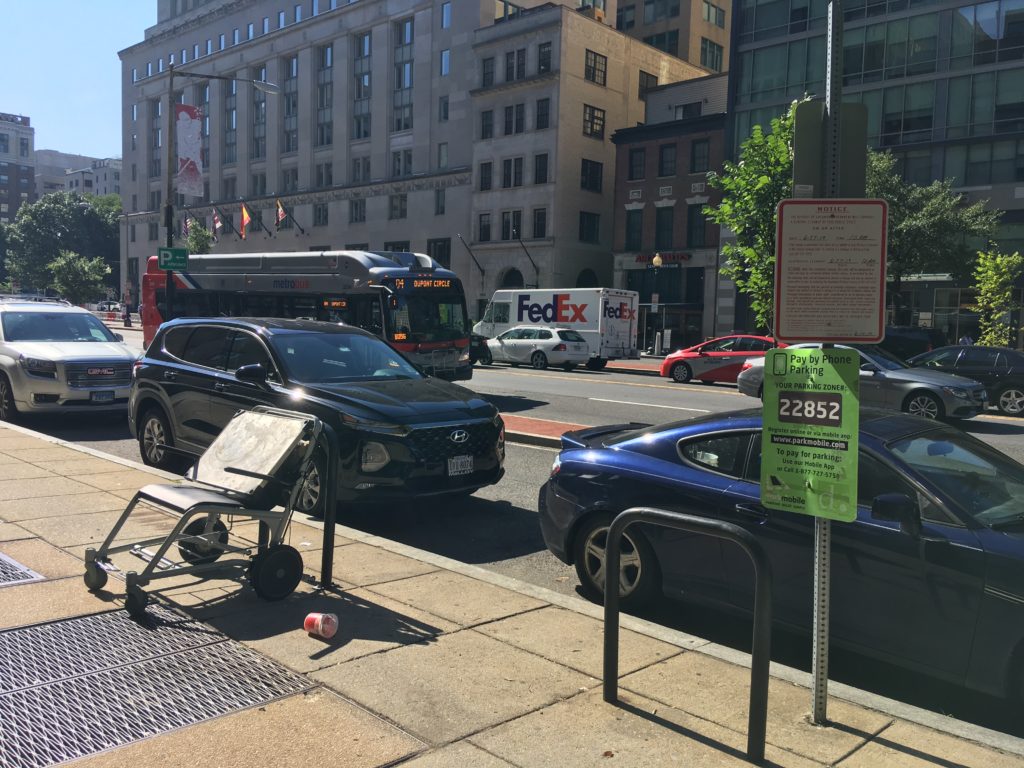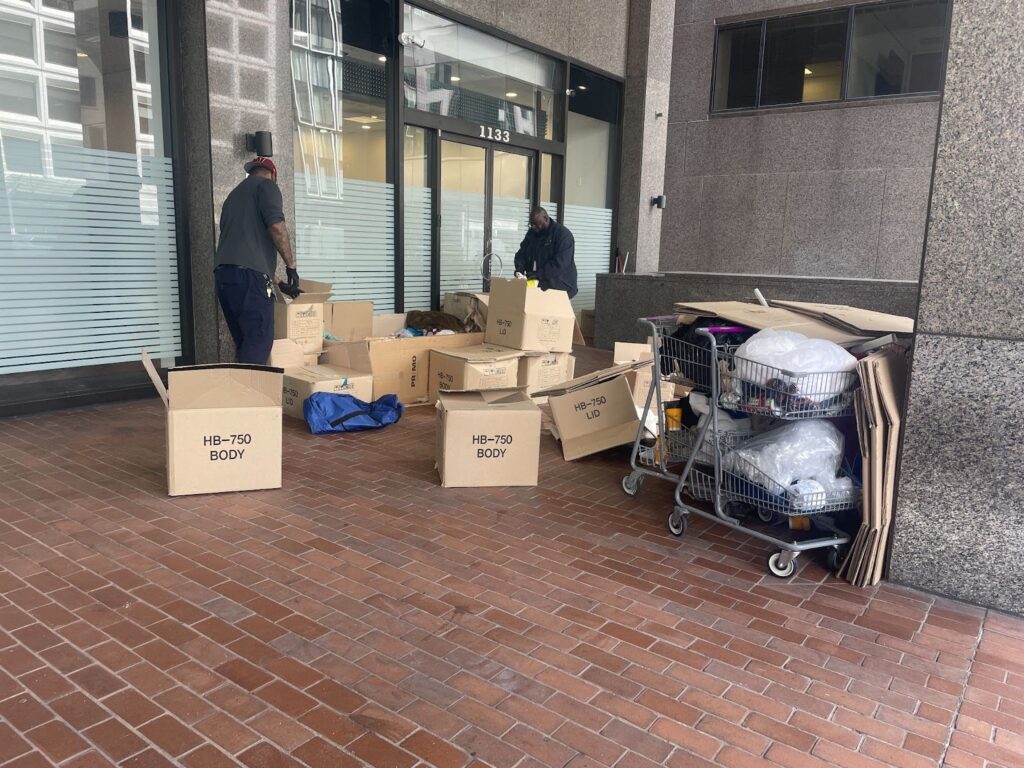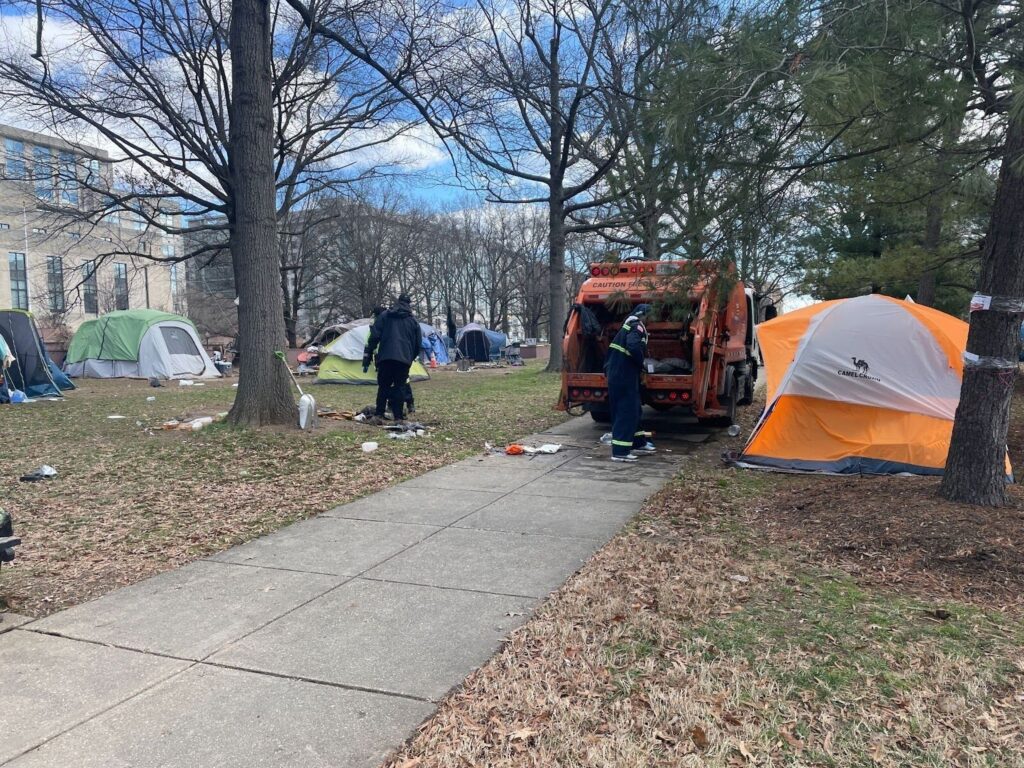On a recent morning, a man pushed a metal cart northward along the intersection of 16th and K streets NW. Pedestrians shuffled past him talking on their phones. Red city taxis idled near The Capital Hilton waiting to ferry guests. A group of people stood near the bus stop and stared past him, waiting in anticipation for the Circulator bus.
For these people, June 27 was just another ordinary day. But for the man with the metal cart, June 27 was the day he had lost almost everything.
A few hours earlier, sometime before 9:15 AM the man stacked an external speaker and a small black suitcase on top of the metal cart. He then rolled the cart across the intersection of 16th and K St NW, and covered the items with a white sheet. He also would have moved a small wire-framed metal chair mounted on wheels. But the chair was locked to a bike rack, and the man couldn’t find the key, a worker from the Department of Public Works (DPW) explained. “The man will be back at 10 a.m. and then someone is supposed to help him cut the lock,” the worker said.
This situation could be described as ordinary if not mundane, or even benign. A person moving their belongings from one place to another is hardly something worth writing about. If it was not for a sign posted five feet from the chair that read “NOTICE. The District will conduct a general cleanup of this public space on Date: 6-27-19 Time: 10 a.m.,” the situation would indeed not be worth writing about.

Notices like the one posted at 16th and K streets NW are required by law to be posted two weeks in advance at locations where the District conducts so-called “encampment clean-ups.” The term “encampment” may conjure up images of campsites, of bivouacs, of mass gatherings of tents. But in D.C., the term assumes an entirely different meaning. “Encampments” are areas where people experiencing homelessness take up temporary residence. An encampment, according to the Office of the Deputy Mayor for Health and Human Services (DMHHS), is “a set-up of an abode or place of residence of one or more persons on public property or an accumulation of personal belongings that is present even when the individual may not be.” The prolonged presence of a single person with belongings in a public space are all it takes for them to be stamped with the label “encampment” in D.C.
On June 27, DMHHS led three separate encampment clean-ups in the part of downtown between Farragut Square and Dupont Circle.
The first two clean-ups on the list went smoothly.
An elderly woman on 19th Street NW between L and M moved her bulky possessions to the other end of the street. A block south, at 19th and K streets NW, a person with an “encampment” had disappeared by 9:30 a.m. The person had taken all their things to another location much farther away.
In comparison, the man with the cart was in the wrong place at the wrong time. At 10 a.m., on the other end of the intersection of 16th and K streets NW, a team of three workers from DMHHS gathered around the area where the man from earlier had moved his metal cart. A white and orange city dump truck, a green recycling semi-truck, and a police squad car were on scene.
After nine minutes, one of the three DMHHS representatives asked about the man’s whereabouts. She then asked where the Department of Human Services (DHS) representatives were. “They usually are supposed to be here,” she said.
A minute later, the senior representative from DMHHS, issued the order to toss the man’s belongings into the back of the garbage truck.
“All of this?” the DPW worker asked.
“Everything,” the DMHHS representative said.
“You sure?” the DPW worker asked again.
“Yes, all of it,” the DMHHS representative replied.
The DPW worker slowly removed the white blanket from atop the metal cart and then dragged the small black suitcase and tossed it into the garbage truck. He then proceeded to move the external speaker and placed it inside the mouth of truck’s compactor. The machine hummed and hissed as it ate the speaker, and popped it into pieces.
The owner of the now-trashed belongings arrived on scene exactly four minutes later, at 10:13 AM. He sprang off a red Jump bicycle, and launched a flurry of questions.

At first, he asked what time it was. He then said he thought someone was going to help him cut the lock for his chair on the other side of the street. He asked what was happening. “I had already moved my stuff,” he said. The man had assumed his belongings were safe, since they had been moved approximately 100 feet away from the sign with the posted notice. He had moved them across a crosswalk, and covered them with a white sheet.
“We said 10:00 a.m.. It’s 10:13 now” one of the DMHHS representatives said.
“Did you not check the time?” another DMHHS representative asked.
Within two minutes two additional police squad cars pulled over on the intersection. The total number of officers on scene went from two to five.
The man’s initial confusion and trepidation gave way to anger.
“Go back to China, miss!” he shouted at the DMHHS representative. The man took aim at the senior DMHHS representative’s ethnicity and let loose a burst of racially charged verbal insults.
If the insults caused her any harm, the representative did not let it show. She stood her ground and said nothing in response.
“I want to press charges,” the man said to one of the police officers.
“There are no charges to press,” the officer replied.
“It’s violating and entering, I need a lawyer,” the man said.
The officer said it was not violating and entering.
“They broke my artwork,” the man said to the group of police officers standing around him now. No one said anything in return. The man then panicked as he tried to reach inside the dump truck to recover the remnants of his speaker.
“I had a couple hundred-dollar bills hidden inside the speaker!” the man, turning around, had said. The police officers and a DPW worker joined him in his search of the back of the truck to see if they could help him find his money.
“It’s embarrassing, disrespectful, and degrading. That’s an Asian lady. I’m an African American man,” he said, after recovering a small shopping bag from the back of the truck. The man jingled the bag to show it was filled with coins and paper bills. He said he kept his money hidden inside the speaker, because no one would ever think to look for money hidden there.
The DMHHS team asked the man if he needed assistance with storage or social services, but he said he wanted to be left alone with what remained of his stuff. The DMHHS team asked the same on 19th Street NW with the old woman who had moved her belongings. They also reached out to other homeless residents they happened to find on the street offering to help them into transitional housing if they wanted it.
A representative from Pathways to Housing was also present on 19th St, but he declined to identify himself or be interviewed for this article. The man with the metal cart also declined to be interviewed for this article. He said he felt like he was being targeted, but declined to elaborate. He said he was too angry to talk. Efforts to reach him later via e-mail were unsuccessful. DPW and DMHHS workers also declined to be interviewed or offer their names.
“Okay, let’s go up to the next one” the senior DMHHS representative said to the team of DPW workers and police officers. They left the scene.
Correction (07.10.2019)
This article has been updated to consistently use the correct acronym for the Office of the Deputy Mayor for Health and Human Services, DMHHS. It previously used DHHS in some instances.








